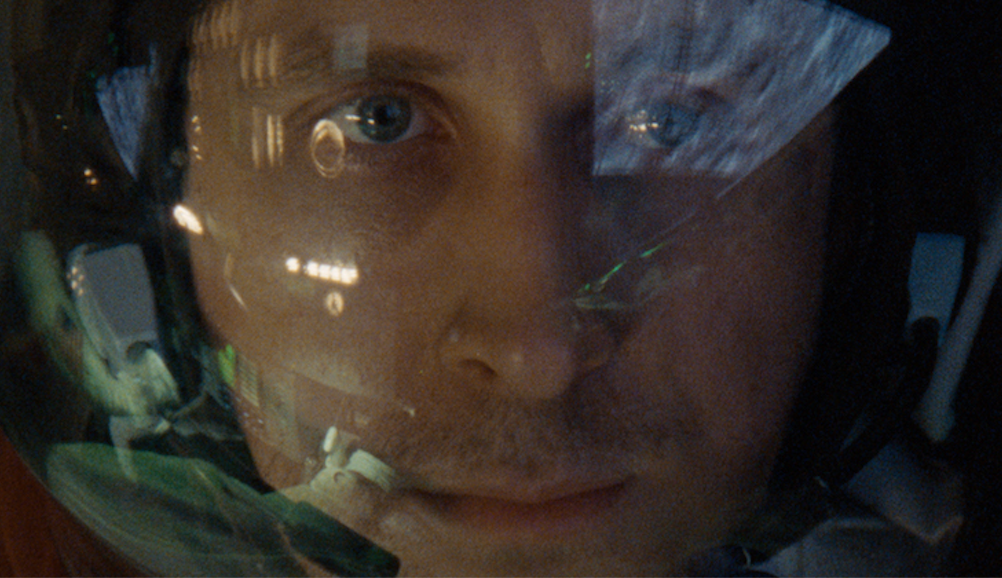First Man
First Man, 2018, 4 ½ stars
Fly me to the moon
First Man puts audience in pilot’s seat
From The Orlando Weekly and The Detroit Metro Times, October 10, 2018
We choose to go to the moon, President Kennedy told us, not because it is easy, but because it is hard.
Director Damien Chazelle wasn’t born when Kennedy spoke those words. Nevertheless, he must have taken them to heart, as he’s fashioned in First Man a film that reverentially demonstrates the difficulty and personal sacrifice of space travel.
This is the story of Neil Armstrong (Ryan Gosling), from his days as a daredevil test pilot in the early 1960s to his “one small step” onto the lunar surface in 1969. Written by Josh Singer and based on the only official biography of Armstrong, by James Hansen, First Man is intimate, unflinching and mostly true. We may never know the exact words Armstrong and his wife, Janet (Claire Foy), spoke in the hours before he boarded Apollo 11, but the film depicts the two quarrelling over how to tell their kids that daddy might not return home. And like almost every other moment in the movie, it feels genuine.
But authenticity doesn’t always make great entertainment, and, admittedly, First Man is a challenging aesthetic experiment, as it adopts Impressionistic storytelling. Unlike many other space films, it’s not always fun, but it is great art. Eschewing joyful entertainment, First Man is often depressing, dour and deafeningly quiet, but so was Armstrong. And therein lies the challenge for Chazelle and Gosling: to showcase a man who shunned the spotlight, spoke little and was misunderstood by most.
The death of Armstrong’s 2-year-old daughter, Karen, in 1962, is central to the film. The tragedy never left the astronaut, and, at least figuratively, Karen became the third moon visitor on that July day in 1969, along with Armstrong and Buzz Aldrin (Corey Stoll, House of Cards). The emphasis on Karen, plus the depiction of Armstrong staring intently, almost worshipfully, at the moon from the Earth over the course of the film, creates a sense of longing. First Man may not have the “right stuff” audiences are expecting, but if you look closely, you will splashes of 2001: A Space Odyssey and even Duncan Jones’s Moon.
Despite Armstrong’s inscrutability, he was all business when it came to NASA. And Linus Sandgren’s cinematography captures his brutally difficult, potentially deadly and nauseatingly claustrophobic work. (Sit at the back of the theater to avoid motion sickness, as even the domestic scenes are packed with handheld shakiness and swish pans mimicking 1960s home movies.)
Gosling, channeling Mark Rylance, speaks volumes with silence. Foy is also excellent as the only audibly passionate character, though she’s often reduced to a familiar “astronaut’s wife” archetype. And Kyle Chandler, Ciarán Hinds and Jason Clarke realistically illuminate the background.
The film represents a giant leap – metaphor intended – for Chazelle. A thematic and visual departure from Whiplash and La La Land, this is also his first feature to not focus on an artist, and his first without music as the subject, though his stylistic sound design is masterful. Thanks to the abundance of space movies, Chazelle isn’t left with many new things to say, but he does find new ways to say them.
Despite the best efforts of Faye Dunaway, Chazelle was denied his La La Land Academy Award by Moonlight. So he’s done his movie nemesis one better: He’s given us the moon itself. And in return, the moon might just give Chazelle his Oscar.
2018 Orlando Weekly / MeierMovies, LLC
